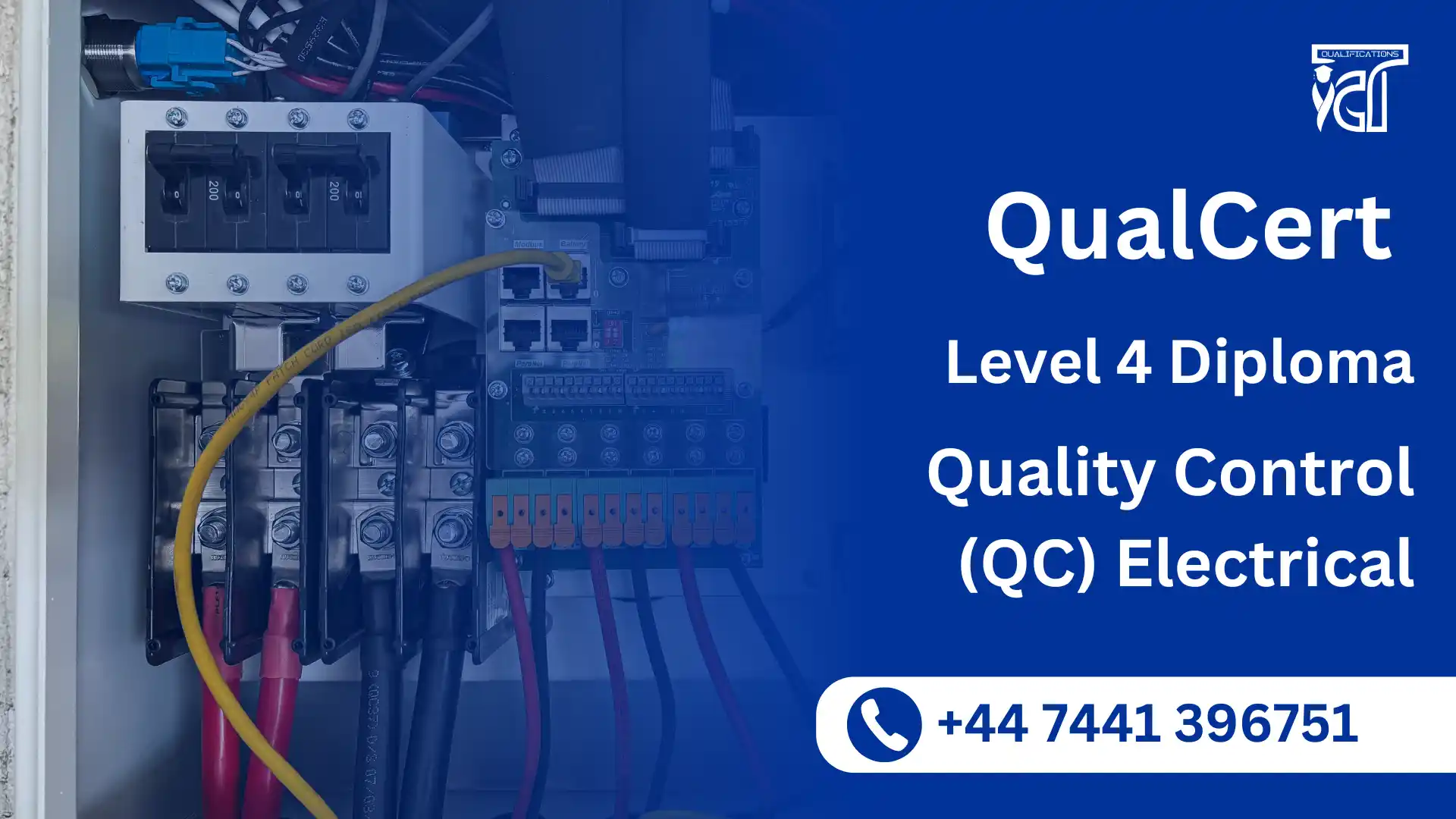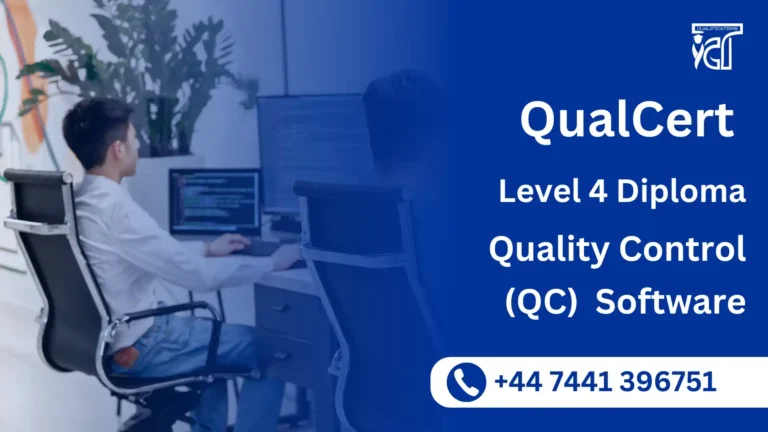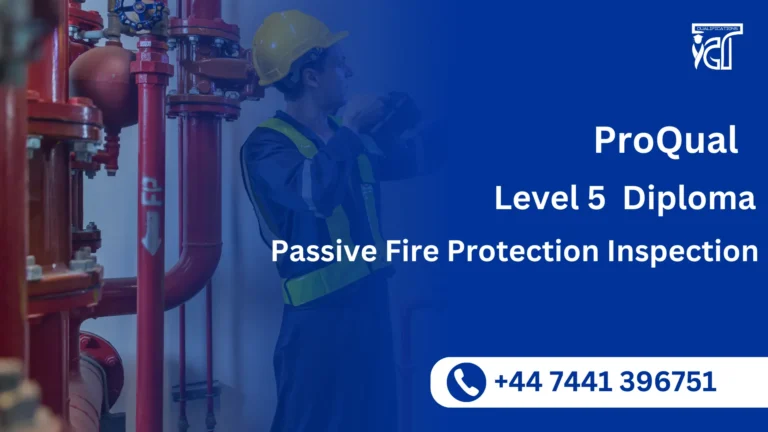The QualCert Level 4 Diploma in Quality Control (QC) – Electrical is a foundational yet comprehensive qualification designed to introduce learners to the essential principles and practices of quality control in the electrical engineering field. This course equips individuals with the skills and knowledge necessary to perform basic quality inspections, conduct electrical testing, and support compliance with industry standards.
Learners will explore key topics such as electrical safety, inspection methods, calibration basics, and documentation practices—all vital to maintaining quality assurance in electrical systems and installations. Emphasis is placed on practical application, preparing students to contribute effectively to quality control processes in real-world engineering environments.
Ideal for entry-level professionals, technical trainees, and those looking to build a career in electrical QA/QC, this diploma serves as a strong stepping stone toward more advanced qualifications and responsibilities in the electrical engineering and quality management sectors.
QualCert Level 4 Diploma in Quality Control (QC) Electrical
The QualCert Level 4 Diploma in Quality Control (QC) Electrical comprises several study units designed to provide learners with a comprehensive understanding of QC principles and practices in the electrical sector. Below is the qualification structure, including the Total Qualification Time (TQT) 450, Guided Learning Hours (GLH) 270, and 72 Credits associated with the program.
| Unit Ref# | Unit Title | Credit | GLH | TQT |
| QC100010 – 1 | Advanced Electrical Quality Control Systems | 15 | 45 | 75 |
| QC100010 – 2 | Electrical Systems Calibration | 15 | 45 | 75 |
| QC100010 – 3 | Quality Control Risk Management | 15 | 45 | 75 |
| QC100010 – 4 | Health and Safety Compliance in Electrical Engineering | 15 | 45 | 75 |
| QC100010 – 5 | Electrical Quality Assurance Techniques | 15 | 45 | 75 |
| QC100010 – 6 | Project Management in Electrical Quality Control | 15 | 45 | 75 |
GLH (Guided Learning Hours) and TQT (Total Qualification Time) are terms commonly used in vocational qualifications to help define the amount of time a learner is expected to spend on their studies.
1. GLH (Guided Learning Hours)
GLH refers to the number of hours a learner spends being directly taught, supervised, or supported during their course. This includes the time spent in activities such as:
- Classroom instruction
- Practical workshops
- One-on-one tutoring or mentoring sessions
- Online learning sessions with tutor support
In other words, GLH represents the time that learners are actively engaged with their instructors or learning activities.
2. TQT (Total Qualification Time)
TQT represents the total amount of time a learner is expected to invest in completing a qualification, including:
- GLH (Guided Learning Hours): Time spent on direct learning, as explained above.
- Self-Directed Learning: This includes time spent on independent study, research, assignment completion, preparation for exams, and any other work the learner does outside of direct teaching hours.
TQT is a broader measure that includes all the time required to achieve the qualification. It helps learners and employers understand the overall commitment required for the qualification.
Key Differences Between GLH and TQT:
- GLH focuses on direct learning with guidance or supervision.
- TQT includes GLH as well as independent study time and other learning-related activities.
Example:
If a qualification has a TQT of 600 hours and a GLH of 250 hours, it means the learner should spend 250 hours in direct learning (classroom, online, or tutor-led sessions) and 350 hours on independent study or research.
Advanced Electrical Quality Control Systems
- Understand the key principles behind advanced electrical quality control systems and their applications.
- Learn to design and implement effective QC systems tailored for electrical engineering projects.
- Gain the ability to assess system performance using recognized quality benchmarks.
- Develop strategies for ongoing monitoring and improvement of electrical system quality.
Electrical Systems Calibration
- Acquire knowledge of calibration techniques for a wide range of electrical equipment and systems.
- Understand the role of precise calibration in maintaining system accuracy and reliability.
- Identify common calibration issues and apply troubleshooting methods to resolve them.
- Apply industry-standard calibration practices in accordance with regulatory guidelines.
Quality Control Risk Management
- Learn to evaluate potential risks within electrical quality control processes.
- Develop practical skills for implementing risk mitigation strategies in engineering projects.
- Utilize risk assessment tools to identify hazards and assess their impact on quality outcomes.
- Make informed decisions to enhance safety, reliability, and compliance throughout project execution.
Health and Safety Compliance in Electrical Engineering
- Understand essential health and safety regulations applicable to electrical work environments.
- Implement appropriate safety measures to ensure compliance with industry standards.
- Evaluate existing safety protocols and recommend improvements where necessary.
- Gain practical knowledge in conducting safety audits and risk assessments in electrical projects.
Electrical Quality Assurance Techniques
- Explore key quality assurance methods used in electrical engineering, including testing and inspection.
- Apply verification and validation techniques to ensure systems meet defined specifications.
- Learn to document quality assurance activities and generate clear, professional reports.
- Understand how continuous improvement contributes to long-term quality performance.
Project Management in Electrical Quality Control
- Develop skills to lead and manage quality control projects within the electrical sector.
- Learn core principles of project planning, scheduling, and resource allocation.
- Coordinate teams and stakeholders to meet quality objectives and deadlines.
- Gain experience in managing project risks, budgets, and deliverables while maintaining quality standards.
Course Benefits
Stepping Stone to Higher Education
Use this diploma as a pathway to more advanced certifications, such as the QualCert Level 5 or Level 6 Diploma in Electrical Quality Control.
Solid Foundation in Electrical Quality Control
Develop a strong understanding of quality control principles, methods, and standards specific to electrical systems and components.
Industry-Relevant Skills
Gain practical skills in calibration, inspection, fault detection, and safety compliance—essential for real-world electrical engineering environments.
Career Entry and Progression
Prepare for entry-level roles such as Electrical QC Technician, QA Assistant, or Electrical Inspector, with clear progression paths to higher qualifications.
Enhanced Workplace Safety Knowledge
Learn how to identify hazards, conduct safety audits, and ensure compliance with health and safety regulations in electrical projects.
Project Readiness
Build project management skills specific to quality control tasks in electrical engineering, including scheduling, team coordination, and reporting.
Hands-On Technical Training
Apply testing and calibration techniques using industry-standard tools and equipment to ensure system accuracy and reliability.
Compliance and Standards Expertise
Understand national and international electrical standards (e.g., IEC, ISO) and how to implement them in daily QC practices.
Boosted Professional Credibility
Earn a recognized qualification that demonstrates your commitment to quality, safety, and excellence in electrical engineering.
Multi-Sector Opportunities
Qualify for roles across industries including construction, utilities, energy, manufacturing, telecommunications, and facility maintenance.
The QualCert Level 4 Diploma in Quality Control (QC) – Electrical is designed for individuals who are beginning their careers in electrical engineering or looking to gain formal training in quality control practices. This course is ideal for:
- Aspiring Electrical Technicians and Engineers
Individuals looking to enter the electrical industry with a strong foundation in quality control, safety, and system reliability. - Junior QA/QC Professionals
Entry-level quality inspectors, assistants, or technicians seeking formal qualifications to enhance their role and responsibilities. - Vocational or Technical Training Graduates
Learners who have completed technical training (e.g., in electrical or electronic systems) and want to specialize in quality control. - Maintenance and Field Technicians
Professionals working in maintenance, testing, or repair roles who want to gain structured knowledge in quality assurance processes. - Health and Safety Support Staff
Individuals assisting in safety roles within electrical environments who need a better understanding of quality control standards and compliance. - Career Switchers
Those from related technical fields (e.g., mechanical, instrumentation, or industrial systems) looking to transition into electrical QA/QC roles. - Team Leaders or Supervisors in Training
Professionals preparing for supervisory roles who need foundational knowledge in managing quality assurance in electrical projects.
Entry Requirements
Register Now
Qualification Process
Qualification Process for the QualCert Level 4 Diploma in Quality Control (QC) Electrical
- Self-Assessment:
Begin by evaluating your eligibility to ensure you meet the qualification requirements, including work experience, knowledge, and language proficiency. - Registration:
Complete your registration by submitting the required documents, including a scanned copy of a valid ID, and paying the registration fee. - Induction:
An assessor will conduct an induction to confirm your eligibility for the course and explain the evidence requirements. If you do not meet the criteria, your registration will be canceled, and the fee will be refunded. - Assignmnets & Evidence Submission:
Provide all assignmnets and the necessary evidence based on the assessment criteria outlined in the course. If you are unsure of the required evidence, consult with the assessor for guidance on the type and nature of evidence needed. - Feedback and Revision:
The assessor will review your submitted evidence and provide feedback. Evidence that meets the criteria will be marked as “Criteria Met,” while any gaps will be identified. You will be asked to revise and resubmit if needed. - Competence Evidence:
Submit final evidence demonstrating that all learning outcomes have been met. This evidence will be marked as “Criteria Met” by the assessor once it is satisfactory. - Internal Quality Assurance (IQA):
The Internal Quality Assurance Verifier (IQA) will review your evidence to ensure consistency, quality, and compliance with standards. - External Verification:
The IQA will submit your portfolio to QualCert External Quality Assurance Verifiers (EQA) for final confirmation. The EQA may contact you directly to verify the authenticity of your evidence. - Certification:
Upon successful completion of all checks, QualCert will issue your official certificate, confirming that you have attained the QualCert Level 4 Diploma in Quality Control (QC) Electrical.







